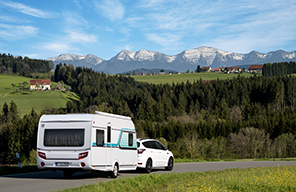Study by the ifeu Institute on the carbon footprint of caravanning trips
Institute for Energy and Environmental Research certifies that caravanning has a good climate balance.
The ifeu, an institute for energy and environmental research, examined the emission of climate damaging CO2 of different modes of vacation in a new study. Result: Caravaning has a comparatively good climate balance. Two studies by the Öko-Institut, a leading independent research organisation working for a sustainable future, had already come to similar conclusions in 2007 and 2013. In each case, the following components of a vacation trip were analysed: Arrival and departure, accommodation and meals as well as local mobility. The ifeu study additionally takes into account the production process (material balance, energy requirements for production, maintenance) and the disposal of the leisure vehicles.

The study is based on a journey of two persons to the island of Rügen. In this case, the caravanning vacation results in a more favourable climatic balance than this would be the case with a journey with a passenger car and an overnight accommodation in a hotel. It is true that motor caravans and combinations of passenger car plus caravan emit more greenhouse gases on arrival and departure due to their size and mass. However, this is more than compensated for by the lower CO2 emissions of the accommodation – in this case a campsite or motor caravan pitch. This is because hotel accommodation releases up to ten times as many CO2 equivalents per person a stay on a campsite or motor caravan pitch.
The shorter the journey to and from the hotel and the longer the stay, the more favourable the comparison is for caravanning. In the assumed Rügen trip, not even the journey by train (if you stay overnight in a hotel) turns out to be much more climate-friendly than the caravanning trip. The same applies to long-distance buses. The CO2 saving by the climate-friendlier arrival and departure with the public long-distance passenger traffic is not sufficient to compensate for the higher greenhouse gas emissions of the accommodation. “The result surprised even us, since train journeys are considered particularly climate-friendly,” says graduate transport engineer Fabian Bergk, from the mobility department at ifeu.
Caravanning more climate-friendly than air travel
The renowned Heidelberg Institute also analysed the climate balance of a trip abroad, specifically to southern France. Here the researchers made among other things a comparison with a flight plus a stay in a hotel. The Caravaning journey lies clearly in front regarding the impact on the climate. The effect of an overnight stay on a motor caravan pitch is even greater than on a campsite. “The ifeu study confirms what earlier studies have already shown: Compared to other forms of travel, caravanning is an environmentally and climate-friendly form of vacation – especially for discovering the most beautiful parts of Germany,” says Daniel Onggowinarso, Managing Director of the caravanning industry association CIVD.
